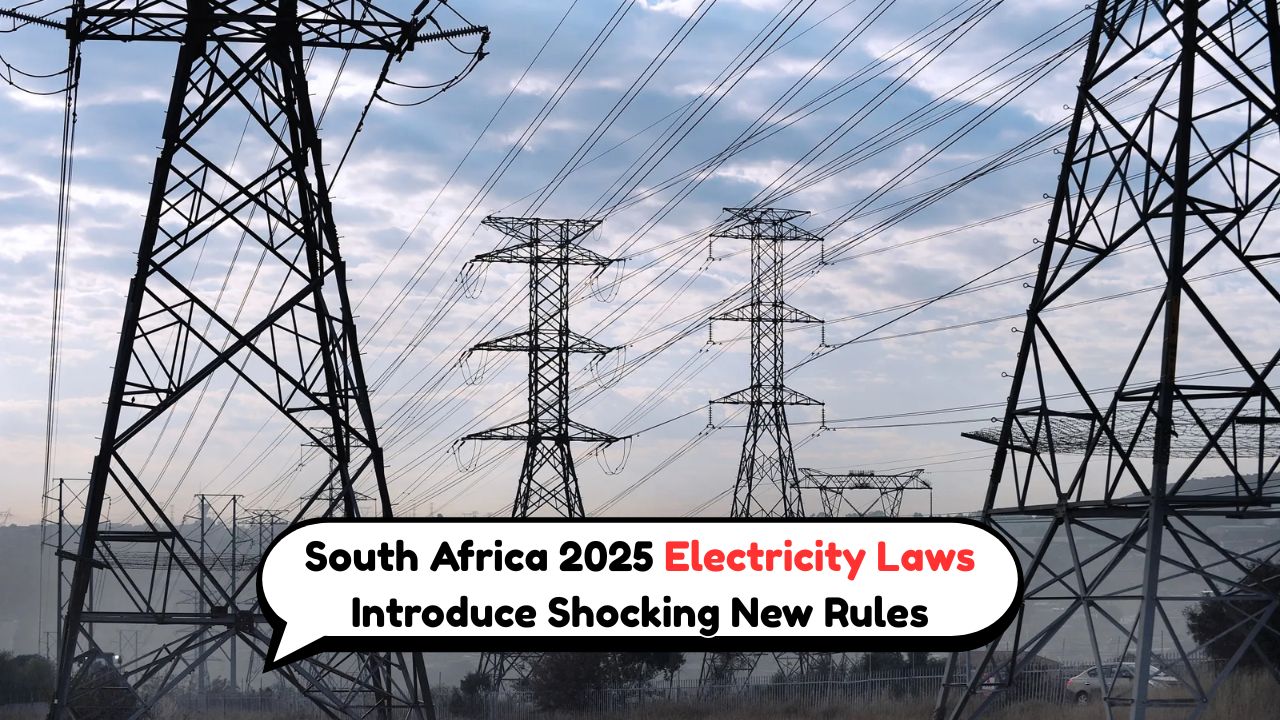South Africa 2025 Electricity Laws – South Africa’s 2025 Electricity Laws have introduced a wave of new regulations that directly affect every household and business across the country. With the government aiming to stabilize the power sector and reduce dependency on unstable supply systems, these laws bring both opportunities and challenges for consumers. One of the biggest changes is the stricter control over prepaid electricity meters, requiring households to upgrade their systems before specific deadlines to avoid power cut-offs. Additionally, the laws introduce penalties for non-compliance and incentives for those who switch to renewable energy sources like solar. For businesses, there are updated tariffs and reporting obligations to ensure transparency in energy use. While some consumers see these changes as a burden due to extra costs, others believe it is a step toward long-term stability and sustainable energy. Understanding these new rules is crucial for avoiding disruptions and taking advantage of potential benefits that the new electricity framework offers.
Key Reforms in the 2025 Electricity Laws
The 2025 electricity reforms include several critical updates that every South African must understand. Firstly, prepaid meter conversion has been made mandatory before a fixed deadline, and failure to comply may result in households being cut off from the national grid. Secondly, new tariffs have been introduced that vary based on consumption levels, encouraging lower usage and promoting energy efficiency. The government has also imposed stricter regulations on illegal electricity connections, with heavy fines and even possible jail terms for offenders. Renewable energy integration is another major highlight, as households and businesses installing solar systems will qualify for rebates and reduced charges. These reforms are designed to reduce load shedding, improve grid reliability, and align the country’s power sector with international sustainability standards. However, the transition demands awareness and immediate action from citizens to avoid penalties or unexpected disruptions in power supply.
Impact on Households and Small Businesses
The changes in South Africa’s 2025 Electricity Laws are expected to have a significant impact on households and small enterprises. For families, the prepaid meter upgrades may require extra expenses, but compliance is unavoidable to ensure continuous access to power. Those who fail to meet the deadlines may face complete shut-offs, forcing them to regularize their connections urgently. On the other hand, consumers who adopt solar energy solutions will enjoy benefits like reduced monthly bills and government-backed incentives. For small businesses, the tiered tariffs mean that careful energy planning is necessary to keep costs under control. While these adjustments might initially seem inconvenient, they are intended to provide long-term relief by reducing frequent load shedding and improving service delivery. Ultimately, households and businesses that adapt early will not only secure uninterrupted electricity but also save money in the long run by taking advantage of the incentives.
Deadlines, Penalties, and Compliance
Compliance deadlines are central to the 2025 electricity laws, and missing them could have serious consequences. Prepaid meter conversions must be completed before the government’s announced cut-off dates, and any delay will automatically disconnect affected users from the grid. For illegal connections, new penalties include fines of up to thousands of rand, and repeat offenders may face criminal prosecution. Businesses, too, are required to submit energy usage reports, failing which they could face regulatory fines. The laws also require that landlords ensure their rental properties meet the updated electricity compliance standards, further extending responsibility to property owners. While these regulations may appear strict, they are part of a broader strategy to strengthen accountability in the energy sector. Households and businesses that proactively comply with the deadlines not only avoid legal trouble but also stand a better chance of benefiting from rebates, tariff reductions, and stable electricity supply.
Moving Toward Renewable Energy and Sustainability
One of the most positive aspects of the 2025 electricity laws is the strong emphasis on renewable energy. The government is pushing for more households and businesses to install solar panels, with subsidies and rebates being rolled out to encourage adoption. Consumers who invest in renewable systems will not only lower their dependence on Eskom’s fragile grid but also reduce monthly electricity expenses in the long term. For businesses, renewable adoption could bring additional recognition and tax benefits, making it a strategic investment. Moreover, communities that embrace solar and wind power collectively could see better local energy stability and fewer blackouts. These sustainability measures are not just about convenience—they are about aligning South Africa with global climate goals and reducing carbon emissions. By 2030, the country aims to significantly increase renewable contribution to its energy mix, and the 2025 electricity laws are the first major step in this ambitious journey.
